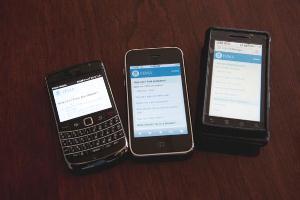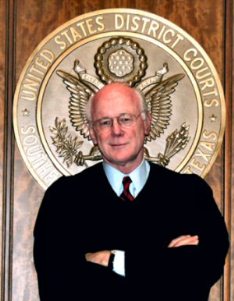Consequences of Prohibition
Drug War Issues
Politics & Advocacy
special to Drug War Chronicle by investigative journalist Clarence Walker, [email protected]
In the wake of the US Supreme Court's January decision in United States v. Jones, in which the high court forbade the warrantless use of GPS tracking devices to surveil people's movements, law enforcement and the Obama administration are scrambling -- not to find ways to comply with the spirit of the ruling, but to find ways around it.

In April, the American Civil Liberties Union (ACLU) released an extensive study of state, federal, and local law enforcement's surveillance practices that illustrate how police track citizens through their cell phones. The findings were staggering. Warrantless cell phone tracking "has become a powerful and widely used surveillance tool for police officials, with hundreds of departments, large and small, often using it aggressively with little or no court oversight," the report found.
After poring over 5,500 pages of records in responses from over 200 local law enforcement agencies, the ACLU researchers reported that "only a tiny minority" -- 10 agencies total -- had obtained a warrant before tracking someone through his or her cell phone.
"What we have learned is disturbing," said ACLU staff attorney Catherine Crump, who helped file public information requests with some 385 law enforcement agencies. "The government should have to get a warrant before tracking a cell phone. Instead, what we found was that the cops track people with no supervision, or in some cases, mostly drug cases, the cop will go to court and only show that it would be relevant to an investigation, which is a lower standard."
The ACLU is calling for law enforcement agencies to desist from using cell phone tracking without a warrant, and is calling on state and federal lawmakers to pass legislation requiring a warrant before police use location tracking in non-emergency situations.
A bill to address the problem is pending in Congress. Senate Bill 1212, the Geolocation Privacy and Surveillance (GPS) Act, is sponsored in the Senate by Senators Ron Wyden (D-OR) and Mark Kirk (R-IL). Companion legislation in the House, House Resolution 2168, is sponsored by Reps. Jason Chaffetz (R-UT), Peter Welch (D-VT) and Jim Sensenbrenner (R-WI.). The bills would require law enforcement agents to obtain a warrant in order to access location information.
Another Senate effort, Judiciary Committee chair Senator Patrick Leahy's (D-VT) Electronic Communications Privacy Act Amendments Act, Senate Bill 2011, offers a partial repair of the problem. It includes a warrant requirement for real-time tracking, but not for historical location information.
The Obama administration disagrees that any action is needed. At a State of the Mobile Net conference held in May, Justice Department Deputy Assistant Attorney Jason Weinstein argued, "[t]he need for such warrantless cell phone tracking is important so it won't cripple the government and law enforcement."
The administration's lawyers insist that when a person turns on a cell phone, the information from the phone is transmitted through a third-party, such as the wireless carrier, and the user thus has no "expectation of privacy."
Warrantless cell phone tracking "should be illegal," said Washington, DC, appellate attorney Stephan Leckar, who successfully represented DC nightclub owner Antoine Jones in the case cited above.
In that case, the Supreme Court reversed Jones' conviction and sentence of life without parole in a cocaine trafficking case after they found substantial evidence that the FBI placed a GPS device on Jones vehicle for 28 days without a search warrant. When police monitored Jones vehicle without a warrant, the court said, "This violated his Fourth Amendment right against unreasonable search and seizure."
According to Leckar, the "third-party" doctrine is a means for law enforcement to get around the Fourth Amendment. "As the law reads," he said, the 'third-party' doctrine doesn't violate the Fourth Amendment. To change this, people will have to petition Congress to change that doctrine."

Judge Lynn Hughes
"There is no trespass or physical intrusion on a citizen's cell phone when the government obtains historical cell-site records from a provider," Justice Department attorneys argued in a brief in an appeals court case in February, adding that cell phone data are not as precise as GPS tracking data.
Most, but not all, recent state and federal court decisions in major drug cases have upheld the right of police to either track cell phones or search them for evidence in an investigation. In March, the US 7th Circuit Court of Appeals upheld a warrantless search of a cell phone by Indiana police, a phone belonging to a meth dealer identified as Abel Flores Lopez. Flores was given ten years in federal prison. His co-defendant Alberto Santana Cabrera received the toughest punishment. Santana got 75 years after failing to assist the government with valuable information on other drug dealers.
But federal judicial opinion isn't unanimous. Last year, in a blistering one-page ruling, US District Court Judge Lynn Hughes of the Southern District of Texas in Houston declared "that the law allowing the government to obtain cell phone records without a warrant is unconstitutional."
In that case, federal prosecutors had subpoenaed MetroPCS and T-Mobile to hand over sixty days of cell phone location data belonging to drug suspects. "The records would show the date, time, called number, and location of the telephone when the call was made," Hughes noted.
As the law now stands, cell phone customers who value their privacy are at the mercy of law enforcement and their wireless service providers. And the wireless service providers are all too happy to work with law enforcement voluntarily, and turn a tidy profit doing it.
Our favorite carriers, including AT&T, Verizon, T-Mobile and Sprint, are in on the action by selling information to police about a person's whereabouts, including the sale of private text messages and cell tower data, which pinpoint the location where someone is using a cell, the New York Times reported in March. Some companies are marketing surveillance fees to law enforcement to spy on targets even though wireless carriers declare that they don't sell their customers' information to police.
The Times found that T-Mobile charges law enforcement $150 per-hour for cell phone data that shows the approximate location of the tower that a cell phone "pings" off of when the user makes a call. It found that Alltel provides a faxed listing of an electronic "Tower Dump" for specific times and dates. The listing is "no charge," but the company charges a flat rate of $500 for those searches.
Verizon Wireless, on the other hand, charges $30-$60 for 15 minutes' worth of tower data, while AT&T charges $75 hourly (a minimum of two to four hours per tower) for a Cell Tower Dump or Cell Site Usage Report. Cell Site Usage also includes subscriber information for the location, date and time when a phone was used.
The Times also found that Sprint once billed the Raleigh, North Carolina, Police Department at a "reduced rate" of $50 for an historic tower search and added $30 more for a search of "L-Site GPS pings," while the ACLU reported that Sprint had billed the Phoenix Police Department $460 for the GPS "pings" over a two-day period in 2009.
"The bottom line is that our mobile phone companies should be working for us, their customers, not the police, says Nicole Ozer, an ACLU staff attorney.
Not only are the wireless providers profiting from your privacy by working with the police, they are lobbying to be able to continue to do so. Even as the debate rages over warrantless cell phone tracking, cell carriers are geared up to oppose legislation that would force the companies to publicly report the number of times their employees provide cell phone location information to police and federal agents.

Sen. Al Franken
"These reporting mandates would unduly prevent us from insuring the public's safety and saving lives," AT&T, Sprint, and T-Mobile said in a joint statement.
The battle continues. Motivated by the ACLU research and news reports on the controversy surrounding warrantless cell phone tracking, US Senator Al Franken (D-Minnesota) recently convened a Senate Judiciary Committee hearing to gather support for the GPS Act. At the hearing, Franken unveiled a letter he had written to Attorney General Holder seeking information on Justice Department cell phone tracking activity, what the department's stance on the standard for requests for historical location data (cell sites, GPS data), and whether the department had changed its practices in the light of the Jones decision.
He is still awaiting a response from Justice.
On the legal front, with state and federal courts split in their decisions on whether warrantless phone tracking violates the Fourth Amendment, the tens of millions of Americans who use cell phones and smart phones will have to wait for the Supreme Court to be the final arbiter. In the meantime, they could just be tracking you -- warrant or not.
This work by StoptheDrugWar.org is licensed under Creative Commons Attribution-ShareAlike 4.0 International
Comments
Counter-surveillance will be big business in the future
With all these scanners, trackers, detectors being used by big business and law enforcement, somebody who designs and markets some scramblers for the general public will make mega bucks.
lol
I am sure the highest bidder will win, its the American way. Bought and paid for politicians.
www.Privacy-Nerds.tk
We the people, have no rights
We the people, have no rights anymore. These big corporations are so greedy they will do anything for a dollar and screw the people supporting them. We are becoming prisoners of our own country. The United States Government has become the world police including this country. They are more concerned about wars and prisons than education and healthcare. If their not trying to f-ck us in our wallet, then they are f--king us in jail !! This country needs to change or we are in serious trouble. It really bothers me to think about what my 3yr old daughter will have to deal with when she's 40. I'll be surprised if she still wants to live in this country.
warrantless cell phone tracking
Thank you for this article there is news in here that I haven't seen elsewhere. I didn't know major carriers were making $ off of us by collaborating with law enforcement.
One solution is to live without a cell phone. Not trying to be a smart-aleck here. I hate the things I don't want people to be able to conveniently interrupt me in my day let alone track where I am or what I'm doing.
I really appreciate jason4244's comments especially about the world his kid will grow up in. I think about the world I grew up in. When I was young you didn't have to pass through metal detectors at the courthouse, police dept. or school. Now you do. There's a lot more authority out there trying to get each and every one of us to submit. Harder & harder to just live your life & be left alone.
In reply to warrantless cell phone tracking by Vic Kelley (not verified)
Warantless cell phone spy
As far as i know, a House subcommittee considered a bill that would address this threat to privacy by requiring a warrant for geolocational surveillance, regardless of the method used. Is it effective enough?
Privacy Tool
There are solutions, but until we get proper legislation making app developers, have you op in instead of opting out, you will never know what you have downloaded to your mobile device.
Using a SilentPocket™ allows you to take control of your own privacy when it comes to Smartphone tracking. MIAmobi™ addresses this issue and many more problems associated with mobile devices. With over 500,000 mobile app developed for smartphones, many of which are stealth and are eavesdropping on your every move. Some are capable of turning on functions on your phone like your mic, camera, GPS, address book and more, even when it has been turned off. There is only one way to stop this if you really want to know for sure that you have control of your mobile device is to block all forms of wifi coming in or going out. Get informed at MIA-mobi.com
MIAmobi also provides a tool to help not only teens but everyone from being distracted by cell phones. One of these tools is the SilentPocket. If we start getting people to use the MIAmobi SilentPocket™ “It will save lives” Out site out of mind. Helps prevents texting and driving. Voicemail rings, beeps, blings or vibes will not be heard. Voicemail, Texts and email will be received once the device is taken out of the SilentPocket. Learn more at MIA-mobi
In reply to Privacy Tool by MIAmobi (not verified)
Thanks for the link!
Thanks for the link! I never heard of it. It just really bothers me that the big phone companies rape their customers every month and turn around and screw them at the same time by selling their info. The 2 year contracts should protect the customer more, after all we pay them for a service, and if we didn't, there would be a lot more unemployed people looking for jobs.
I assume if you have both cell data (3 or 4G), and gps off, its a little more difficult to pinpoint?
As far as i know about it
As far as i know about it warantless mobile tracking, a House subcommittee considered a bill that would address this threat to privacy by requiring a warrant for geolocational surveillance, regardless of the method used. Is it effective enough?
Elected Officials wouldn't know what (REAL) FREEDOM is...
Does turning the cell phone
Does turning the cell phone off help? Or removing the chip?
No More Privacy Ever Again
mobile tracking
Delacon’s Phone Lead Alert lets you track both the web source of a lead and the way in which keywords used in internet searches convert into phone enquiries.
Granted I am all for people
Granted I am all for people having their privacy...but today a woman's purse was stolen with over $1000 worth of property inside, including her cell phone. Being able to ping her phone would have allowed us to potentially find the suspects, since we requested it immediately upon finding out her phone was in the purse.
Unfortunately, AT&T felt that this was not an exigent circumstance, and would not do it. Now this woman has to pay even more money by changing locks in her home and potentially her car, in addition to what she will have to pay to replace all of her property.
I think there should be certain situations where we are able to ping phones, especially when there is a victim to a crime and we have the victim's consent.
Add new comment